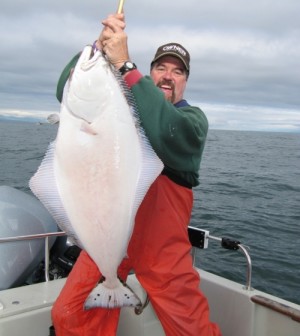Halibut Season Opens in Washington

The following is a press release from the Washington Department of Fish and Wildlife.
Anglers fishing for halibut in Washington waters will see a similar season structure as compared to 2017 when fishing gets underway in May.
The Washington Department of Fish and Wildlife (WDFW) establishes halibut seasons using catch quotas adopted by the International Pacific Halibut Commission for coastal fisheries from California to Alaska. Washington recreational halibut fisheries will be managed to a quota of 225,366 pounds, slightly less than in 2017.
This year’s overall recreational halibut quota would have been about 11,000 pounds lower if not for a shift in quota from the commercial sablefish fishery, which catches halibut incidentally. The commercial fishery’s allocation of halibut was reduced in an effort to provide more opportunity for recreational halibut anglers.
As in 2017, marine areas in Puget Sound and on the coast – with the exception of Marine Area 1 – will be open on the same days throughout the season. Marine Area 1 (Ilwaco) will be open three days per week until quota is met.
In all marine areas open to halibut fishing, there is a one-fish daily catch limit and no minimum size restriction. Anglers may possess a maximum of two fish in any form while in the field and must record their catch on a WDFW catch record card. New for 2018, in response to public input, there will be an annual limit of four halibut.
Anglers should check the WDFW website to ensure a specific area is open prior to fishing.
Season details are as follows:
2018 Puget Sound halibut seasons
- Marine areas 5-10 will be open May 11, 13, 25 and 27. Puget Sound will be managed to an overall quota of 60,995 pounds. Depending on available quota, areas will re-open to halibut fishing June 7, 9, 16, 21, 23, 28 and 30.
- Marine areas 11, 12, and 13 will remain closed to halibut fishing to protect threatened and endangered rockfish species.
2018 Pacific Coast halibut seasons
- Marine Area 1 (Columbia River) opens Thursday, May 3, and runs three days per week (Thursday, Friday and Sunday) until the subarea quota is taken or Sept. 30, whichever occurs first. The nearshore area opens to fishing May 7 on a Monday-through-Wednesday schedule. Coordinates for the nearshore fishery are available online. The all-depth fishery will be managed to 11,182 pounds (Oregon accounts for 5,284 pounds of this quota); the nearshore quota is 500 pounds.
- Marine Area 2 (Westport): The all-depth fishery opens May 11, 13, 25 and 27 as long as there is sufficient quota. Depending on available quota, additional fishing days may be scheduled for June 7, 9, 16, 21, 23, 28 and 30. The northern nearshore area will open on the Saturday after the all-depth fishery closes and will continue seven days per week until Sept. 30, or until the nearshore quota is reached. The all-depth fishery will be managed to 44,341 pounds; the quota for the northern nearshore fishery is 2,000 pounds.
- Marine areas 3 (La Push) and 4 (Neah Bay) will open May 11, 13, 25 and 27, as long as there is sufficient quota. Depending on available quota, additional fishing days may be scheduled for June 7, 9, 16, 21, 23, 28 and 30. The combined quota for both areas is 111,632 pounds.
Fishing regulations include depth restrictions and area closures designed to reduce encounters with yelloweye rockfish, which must be released under state and federal law. Anglers are reminded that a descending device must be on board vessels and rigged for immediate use when fishing for or possessing bottomfish and halibut.
Information about descending devices can be found on WDFW’s webpage.
Image courtesy Terry Rudnick










